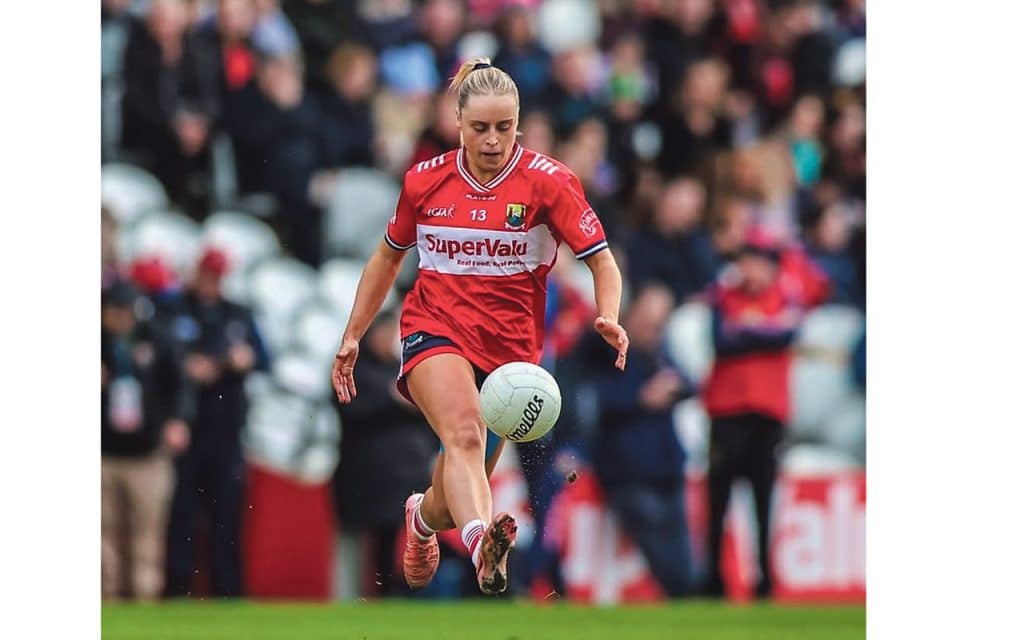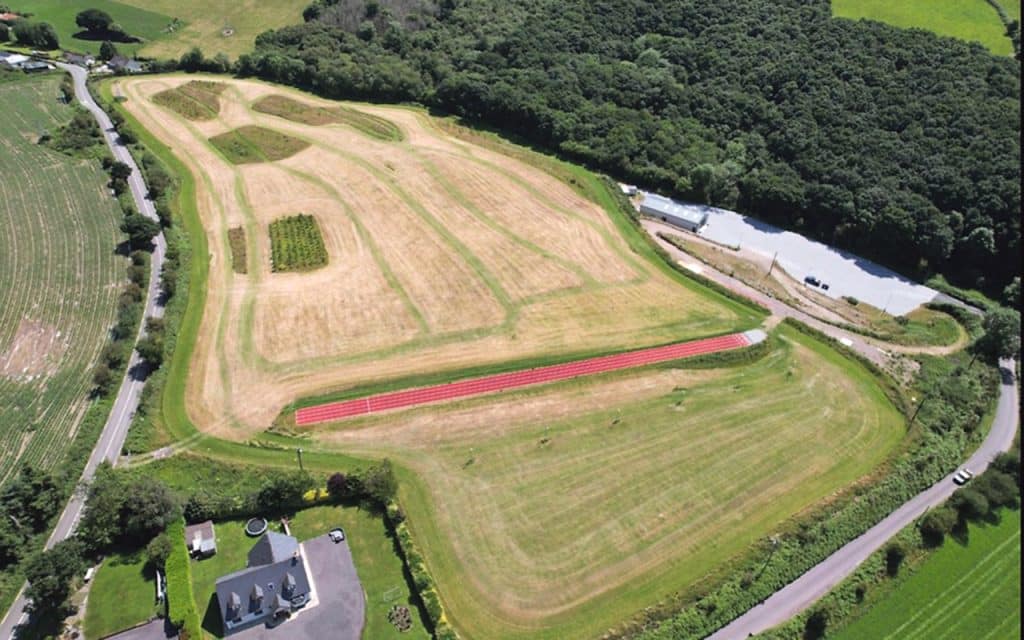
A central figure on the Cork Senior Ladies Football team, Laura O’Mahony’s sporting journey is rooted in her hometown of Skibbereen. Her passion for Gaelic football began in her back garden and, since 2010, Laura has played with her club O’Donovan Rossa. When she’s not on the field, Laura works as a secondary school teacher in Kinsale Community School. She chats to Niamh Coughlan about some of the highlights and challenges of playing football at club and county level.
Laura grew up in Skibbereen and, through school, attended the local Cúl Camps where she discovered her love for Gaelic football. “My earliest memory of playing football goes back to an U12 match with O’Donovan Rossa against Bantry Blues in Bantry. We actually have a picture from that day framed at home. When our club formed an LGFA team in 2010, I joined straight away.”
After the amalgamation of Skibbereen’s three secondary schools, she continued her studies at Skibbereen Community School, all while balancing her commitments to O’Donovan Rossa and the Cork underage teams. Alongside football, she also played some basketball when in Mercy Heights.
Representing Cork has always been one of Laura’s greatest aspirations. “From a young age, I dreamed of playing and competing at the highest level, inspired by the strong legacy of Cork Ladies Football and the remarkable players who enjoyed that historic era of success. Being from Cork makes me extremely proud, and every time I wear the jersey, it’s about more than just representing myself. I’m representing my family, my club, the young girls playing football across our county, and the exceptional players that played before me.”
Cork’s 2025 senior campaign began with high hopes in the TG4 All-Ireland Senior Championship. Drawn in a challenging Group 2 alongside reigning Munster champions Kerry and Mayo, Cork faced tough opposition from the start.
Although they began strong in the group stage kick-off against Kerry in June of this year, Cork conceded in the second half, succumbing to a 5-7 to 2-9 defeat to the Kingdom. Following that setback, Cork were under pressure to maintain their place in the Championship. In their quarter-final tie, they faced Dublin and suffered a comprehensive 3-15 to 0-7 defeat, bringing their 2025 championship run to an end.
“Both this year and last year brought some tough defeats for the team, but like every season, those setbacks became the starting point for what comes next. I’ve always believed you learn more from your defeats than your wins, and that has certainly been true for us. Last year’s loss to Galway, for example, fuelled our drive to earn promotion back to Division 1 at the start of this season. In the same way, I’ve no doubt that our loss to Dublin in this year’s championship will be carefully analysed and used as motivation to build towards an even stronger campaign next year.”
One of the biggest challenges Laura has faced in the sport is the sheer demand of long seasons. For the past number of years, she has been fortunate to enjoy great success with O’Donovan Rossa, but with that comes almost year-round football. “I’d often go from playing with my club right up until December, to starting back into intercounty training at the end of the same month. It can definitely make it difficult to schedule holidays or real downtime, but honestly, I wouldn’t change the last few years for anything.”
Growing up, Laura’s greatest influence has always been her family. “From the early Saturday mornings spent driving me up and down to Cork, to the constant feedback, support, and motivation, I wouldn’t be where I am today without them.” She also acknowledges her first club coach, Michael McCarthy, whose encouragement and positivity helped her develop a love for the game from a young age. Beyond home and club, Laura looked up to Cork greats such as Briege Corkery and Valerie Mulcahy who are fantastic role models and athletes.
Since stepping up to senior football, the biggest challenge for the Skibbereen native has been adapting to the physicality of the game. “The strength and power required in tackles, along with the speed and intensity at which the game is played, demanded the biggest adjustment. Getting used to that tempo was the toughest part of making the transition for me.”
Between club and county games, training requires a balanced approach to optimise performance, while incorporating rest and recovery, and to avoid injury. “A typical training schedule usually includes three pitch sessions and around two gym sessions each week. Of course, this can vary depending on matches. For instance, during the current club championship, our routine shifts to two midweek training sessions with games at the weekend.”
Back in 2020, Laura suffered a knee injury that kept her sidelined for nearly 11 months. “Thankfully, I am very lucky to say that I have usually only had very small niggles that have required a short time to get right. Luckily, with the help of fantastic physios and rehab specialists, and a brilliant support system around me, it wasn’t long until I was back on the pitch again!”
Playing at the highest level requires more than just physical preparation, mental focus plays a huge role too. For Laura, having a sense of control is key. “I definitely think controlling the controllables helps me in my preparation ahead of big games. Whether it’s making sure I have proper nutrition and hydration, or getting enough sleep, those things cater for the physical side. On the other hand, I try not to think too much about the game until a day or two beforehand, which helps ease any nerves. I also find that using visualisation techniques really benefits me.”
Fitness is a central part of her everyday lifestyle, and she is always looking to improve, even in the smallest details. “Looking back at last year’s intercounty championship, I wasn’t entirely happy with my finishing and composure in front of goal, so that became an area I aimed to improve on throughout both club and intercounty this season.”
Like any sport, there have been ups and downs both in club and county. |I’ve been very fortunate to experience success both in a Skibb and a Cork jersey. However, my favourite moment so far has to be winning the Junior All-Ireland Final with my club back in December 2023. If I could bottle that feeling when the final whistle blew, with all our friends and family rushing onto the pitch to celebrate what we had just achieved, I definitely would.”
On the other hand, one of the toughest defeats came while playing with the home side. Losing to a strong Annaghdown team in the All-Ireland Intermediate semi-final last season was a difficult moment to process for her. However, like any loss, the team has used it as motivation to bounce back and compete at the senior grade this year.
Creating a positive dressing room environment before a game may seem like a small gesture, but it has a big impact for the girls. “It’s a space we use to meet and bond both before and after training, and arriving early gives us time to chat beforehand. On match days, however, the dressing room is definitely more focused, as everyone prepares for the game ahead. Usually, we have a speaker playing, with our shared playlist. At this time, the girls might go for a walk, or do stretching and activation exercises specific to their own routines. Overall, it’s a place where we’ve grown closer together as a group and feels like a safe space.”
The conversation around women’s representation in sport continues to grow year on year, with brands like Lidl and others shining a spotlight on women in the GAA through their campaigns and advertisements. “It’s fantastic to see that the profile of ladies’ football in Ireland has been, and is, growing every year, with more media coverage, larger attendances, and greater visibility and support for female athletes. As a result, the younger generation of players now have accessible role models to inspire them.”
To keep building on this momentum, the more double-headers and prime fixture slots, along with greater promotion at grassroots level, would make a huge difference. She greatly appreciates the progress and growing support already in place, but feels that consistently showcasing the game on bigger stages, by playing in the large stadiums around the country, will be key to closing the gap and further raising the profile of Ladies Football.
From one footballer to another, Laura’s advice to young girls is simple: stay committed. “Being committed through practicing your skills every day, being committed to going to training religiously even when you might not feel like it. Lastly, being committed through hard work on the pitch and simply enjoying your football when playing will take you a long way!”
Like many, balancing work, hobbies and professional life can be challenging. Laura works as a secondary school teacher in Kinsale Community School, where she teaches Maths and P.E.
“Since I’ve been representing Cork from a young age, travelling up for training on school evenings and weekends, I’ve grown very used to managing the balance. The key for me is good time management and being organised, knowing what’s a priority and what needs to be done before heading to training or to work. At the same time, it’s vital to make space for myself outside of work and football, to enjoy life and have some proper downtime.”
Away from football, Laura enjoys keeping things simple. She usually relaxes at home in front of the TV with her family, and spending quality time with both family and friends is what helps her unwind. It gives her the chance to reset, switch off from everything, and avoid burnout.
Looking ahead, one of Laura’s main goals for the next few years is for O’Donovan Rossa to be consistently competitive at senior level. She describes the recent successes with her club as both fantastic and a privilege, creating a special bond between the players and management that she feels is truly unique.



